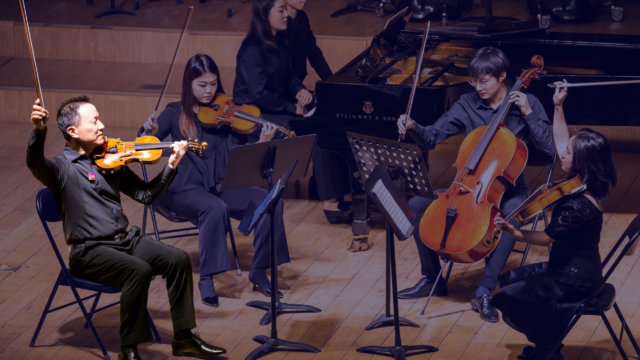Power of Inclusion – Omaha Symphony: Musicians as Family

“It sounds like a cliche,” Bobby Scharmann admits, “but it’s true. We’re all a family. I have my orchestra mother, my orchestra sister.” Scharmann, now Associate Principal Bass, has been in the Omaha Symphony for 10 years, and chair of the Orchestra Committee for two, so he is in a position to know. How does an orchestra evolve such a positive vibe? Can auditions select for ‘Nebraska nice?’ “Well, we keep the screens up through the final round of auditions. I guess we’re just really fortunate.”
Yet Scharmann can point to factors both large and small that contribute to an orchestra where players feel welcome and heard. Inclusion training has had something to do with it. “That was really successful. We’re now more cognizant of the language we use with others,” he says, reducing harassment and unintended micro-aggressions. Per service musicians were paid to attend alongside core players, so participation was high.
A change in concert dress code, away from male/female to option 1/option 2, proved to address needs as yet unknown. “At the time of the change, I was not aware of anyone who might take advantage of it, but later I was pleasantly surprised to see a handful of colleagues elect an option that differed from the previous dress code for their gender identity.”
Then there is Forte, the Omaha Symphony’s education and community program, where musicians curate their own programs for schools and community venues based on parameters received from staff. Many members of the orchestra participate. Not only do musicians have agency as programmers, they also feel energized by the impact they have. Scharmann describes sensory-friendly concerts for children impacted by autism. “When you hear these kids squealing with joy, you know you’re doing something important.” Another program, in a high school, combined hip-hop with baroque music, complete with breakdancers. “When we bring this music to audiences not otherwise exposed, and they say it’s really cool, we’re sidestepping stereotypes about stuffy orchestras,” he says.
Scharmann also credits management with being good listeners, even when musician concerns may seem small. “Small changes can make a big difference for a few musicians to feel more comfortable doing their job,” he points out. The Omaha Symphony has been performing in new venues to reach new audiences, and there are always hurdles when away from the orchestra’s home base.
Brown-bag dinner talks between double rehearsals contribute to transparency and inclusion. Several times each season, musicians can offer ideas, concerns, and questions. One musician used a brown-bag dinner to give a presentation on financial literacy. “A lot of people got a lot out of that,” Scharmann says.
Orchestra Committee itself is quite active in promoting community among musicians. They keep musicians informed with their own emails, share personal stories on a private Facebook group, and even have a private marketplace to exchange goods. Orchestra Committee has six members, elected to two-year terms, including a “courtesy member,” who takes care to send flowers, cards, or similar to musicians experiencing hardship or a loss in the family. And on retirements, Orchestra Committee coordinates getting everyone to autograph a framed orchestra portrait, presented on stage at a musician’s final concert.
“I try to be pro-active about meeting new musicians,” Scharmann adds, so everyone feels they know at least one person at their very first rehearsal. While the practice is not formalized, Scharmann expects his successor to continue the tradition.
What ties together the small and large factors for belonging seems to be an attitude of inclusion, that sense of family. “Conflicts among players just don’t really happen here,” Scharmann says. “I feel like I could go to anyone if I need help.” It can be difficult to pinpoint the roots of a healthy work environment. “By and large, I think I can credit our positive culture quite simply to the people who make up our fantastic organization.”
Photo: Musicians have agency as programmers, and they also feel energized by the impact they have. Pictured here: Omaha Symphony Associate Principal Bass and Orchestra Committee Chairman Bobby Scharmann. Photo by Casey Wood.
Related
-
Learn | Equity, Diversity & Inclusion
Strategic Social Media for Today’s Orchestras
-
Learn | Equity, Diversity & Inclusion
Discover the Power of Inclusion in Orchestra Culture
-
Learn | Equity, Diversity & Inclusion Member-only Content
Discover the Power of Inclusion in Orchestra Culture
Become a member
Thank you for your interest in the League of American Orchestras! We are dedicated to advancing the orchestral experience for all.
Join Now
